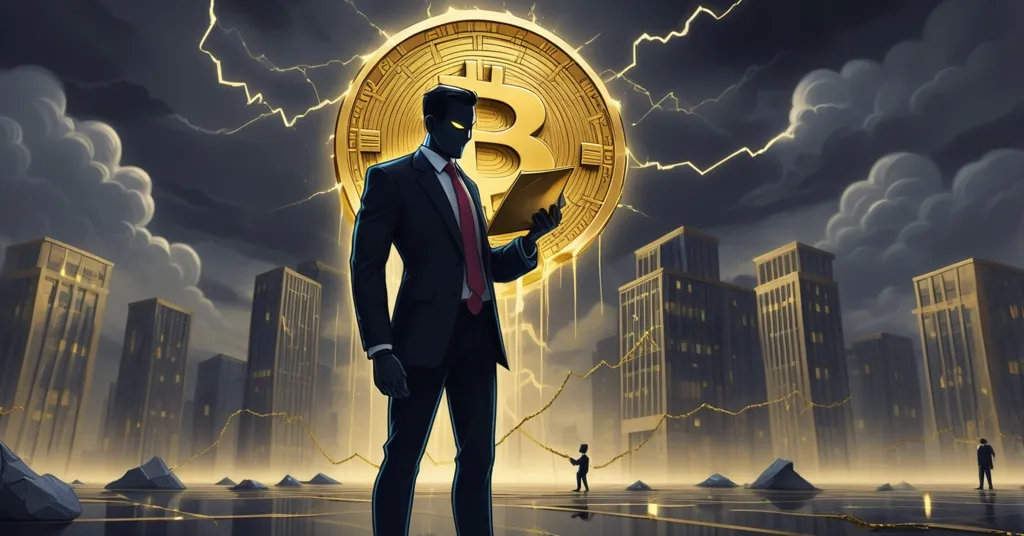Trump Pardons Binance Founder CZ Amid Pay-for-Crime Allegations and Crypto Backlash

Trump Pardons Binance Founder CZ: Pay-for-Crime Allegations Fuel Crypto Controversy
President Donald Trump’s pardon of Changpeng Zhao, widely known as CZ, the founder of Binance, has unleashed a torrent of outrage, with critics slamming the move as a glaring example of political favoritism intertwined with shady financial dealings. Announced on October 23, 2025, this decision to wipe clean CZ’s conviction for money-laundering violations under the Bank Secrecy Act has sent shockwaves through the crypto community, raising urgent questions about ethics, influence, and the future of regulation in this space.
- Pardon Firestorm: Trump’s full pardon of CZ erases a serious conviction tied to anti-money-laundering failures, amid suspicious business ties with Trump family ventures.
- Financial Overlaps: Connections through World Liberty Financial, Dominari Holdings, and Binance-related deals suggest potential collusion, intensifying “pay-for-crime” claims.
- Industry Backlash: Voices like investor Adam Cochran and Senator Elizabeth Warren denounce the pardon as “disgusting” and a dangerous precedent for crypto accountability.
The Pardon: Why Now?
CZ, the former mastermind behind Binance—the world’s largest cryptocurrency exchange by trading volume—found himself in hot water when he pleaded guilty in November 2023 to charges under the Bank Secrecy Act. For those new to the game, this U.S. law mandates that financial institutions, including crypto exchanges, implement robust systems to detect and prevent money laundering and other illicit activities. Under CZ’s watch, Binance was accused by the U.S. Department of Justice (DOJ) and the Treasury’s Financial Crimes Enforcement Network (FinCEN) of facilitating transactions for entities as infamous as Hamas and the Wagner Group, blatantly violating anti-money-laundering (AML) and sanctions laws. The consequences were seismic: CZ forked over a $50 million personal fine, resigned as CEO, and served a four-month prison sentence, walking free in September 2024. Binance itself admitted to criminal charges, including conspiracy and operating as an unlicensed money transmitter, settling with authorities for a jaw-dropping $4.3 billion—one of the heftiest corporate penalties ever recorded.
So, why would Trump step in with a full and unconditional pardon now? The White House pitched it as a middle finger to the Biden administration’s so-called “war on cryptocurrency,” portraying CZ as a casualty of regulatory overreach. But the timing stinks to high heaven. Whispers of a potential pardon started as early as 2025, with formal requests from CZ confirmed by spring. This isn’t Trump’s first rodeo with crypto clemency either—on January 21, 2025, he pardoned Ross Ulbricht, the Silk Road founder tied to over $200 million in illegal Bitcoin transactions. That already raised eyebrows, but CZ’s pardon sets a new low for brazen moves, especially given the tangled web of financial links between Trump’s family businesses and Binance’s ecosystem.
Financial Ties Under the Microscope
Let’s cut through the noise and lay out why this reeks of a backroom handshake. World Liberty Financial, a crypto outfit founded by Trump and his sons, launched a dollar-pegged stablecoin dubbed USD1 in April 2025. For the uninitiated, a stablecoin is a cryptocurrency engineered to hold a steady value, typically tied to a fiat currency like the U.S. dollar, to dodge the wild price swings of assets like Bitcoin. USD1 runs on both the Binance Smart Chain (now BNB Chain)—a blockchain built by Binance for fast, low-cost transactions and decentralized apps—and Ethereum, directly tying it to Binance’s infrastructure. Then comes the kicker: a $2 billion investment from Abu Dhabi-based MGX Fund Management Limited into Binance, using USD1 as the medium. Think of this as a colossal bet on Binance’s future, with Trump’s stablecoin as the poker chip—begging the question, who’s really cashing in?
Zach Witkoff, co-founder of World Liberty Financial, hyped this deal as “a strategic vote of confidence in Binance and in the U.S.-linked stablecoin ecosystem.” Fine words, but when the guy pardoning CZ is tied to the exchange reaping billions, it looks less like confidence and more like a transaction. And there’s more. Dominari Holdings, a New York investment firm linked to Trump’s sons, Eric and Donald Jr., and based out of Trump Tower, teamed up with Hemi—a project backed by CZ’s family office—in October 2025. Hemi aims to boost Bitcoin’s functionality by enabling complex applications like smart contracts, something Bitcoin’s bare-bones design doesn’t natively support. Their partnership focuses on digital asset infrastructure and exchange-traded funds (ETFs), and it conveniently dropped just weeks before the pardon. If this isn’t a handshake so tight it’s practically a bear hug between Trump’s crew and CZ’s camp, I don’t know what is.
Binance’s History of Compliance Failures
Before we go further, let’s not forget why Binance was in the crosshairs to begin with. Beyond the headline-grabbing $4.3 billion fine—that’s not pocket change, even for a crypto titan—it’s worth noting the depth of their screw-ups. FinCEN’s 2023 findings flagged over 1.3 million suspicious transactions on Binance between 2018 and 2021, many linked to darknet markets and ransomware operations. This isn’t just negligence; it’s a neon sign screaming “we don’t care” to regulators worldwide. While Binance still commands over 40% of global crypto trading volume as of 2025, its rap sheet fuels the narrative that crypto is a criminal’s playground—a stereotype the industry has fought tooth and nail to shake. Pardoning the guy at the helm during this mess doesn’t exactly scream “clean slate.”
Public and Political Backlash
The reaction has been nothing short of volcanic. Ethereum investor Adam Cochran pulled no punches, branding the pardon “disgusting even for Trump” and calling it “the clearest case yet of pay-for-crime.” When you’ve got an exchange with a history of turning a blind eye to dirty money, and a pardon synced with billion-dollar deals, it’s hard to argue with his outrage, as highlighted in a recent critique of Trump’s pardon of CZ amid Binance-linked deals. Senator Elizabeth Warren, never one to shy away from roasting crypto’s underbelly, warned that “if Congress failed to act against such exchanges of influence, it would be complicit in normalizing corruption.” Alongside Senator Jeff Merkley, she’s sounding the alarm on how Trump’s financial links to Binance could poison political integrity. This isn’t just hot air on social media; it’s a stark reminder of how political muscle can warp legal accountability when billions are on the table.
Could this be Trump’s way of declaring open season for crypto moguls? Some in his camp might argue it’s a bold move to lure innovation back to U.S. shores by easing fears of prosecution. But at what cost? If money buys mercy, we’re not accelerating toward a decentralized future—we’re just repainting the same old corrupt systems in blockchain colors. This isn’t a win for freedom or privacy; it’s a middle finger to every regulator trying to tame crypto’s wild west.
Impact of CZ Pardon on Crypto Regulation
What does this mean for the industry at large? First off, the pardon obliterates CZ’s conviction, clearing any legal roadblock to him returning to Binance’s leadership—if the board and regulators in key markets like the UK or Singapore don’t slam the door shut. Whether he’d even want to wade back into that swamp is another story, but the option’s there. For Binance, already under a microscope, this could be a double-edged sword: a PR coup showing they’ve got powerful allies, or a trigger for even harsher oversight as regulators smell blood. Globally, bodies like the EU with its Markets in Crypto-Assets (MiCA) framework might tighten the screws on Binance’s operations to offset perceived U.S. leniency.
More broadly, this sets a rotten precedent. It signals that if you’ve got the right connections, you can dodge accountability for even the most flagrant compliance disasters. That’s not the message a sector craving mainstream legitimacy needs. Since 2021, U.S. agencies have ramped up scrutiny on exchanges, with Binance’s penalty marking a high-water mark for enforcement. Trump’s clemency—part of over 200 such actions across his terms—carves out a loophole where political will can override judicial hammer. Add the global angle, with foreign investments like MGX’s $2 billion play, and the waters get murkier. Transparency is already crypto’s Achilles’ heel; moves like this make it damn near impossible to claim we’re building a fairer financial system.
Community Trust and Bitcoin’s Ethos
How does this land with everyday Bitcoin holders or DeFi enthusiasts? Scrolling through X, you’ll see a split—some call for Binance boycotts, livid at yet another stain on crypto’s rep, while others shrug, saying the system’s always been rigged, blockchain or not. As someone with Bitcoin maximalist leanings, I can’t help but wince. Bitcoin’s beauty is its untouchability—no president, CEO, or pardon can meddle with its code. But when political games swirl around altcoin ecosystems like Binance’s BNB Chain, which fill niches Bitcoin shouldn’t touch, it drags mud across the whole space. Are we trading one form of centralized power for another, just with flashier tech?
I’m all for disrupting broken systems and pushing effective accelerationism to get decentralized tech into the world’s hands. But if this pardon is the dirty deal it appears to be, it’s not progress—it’s a step back into the cronyism we’re meant to be dismantling. Scammers and opportunists have no place in this revolution, whether they’re wearing suits or shilling shitcoins. We’ve got to call this out, even if it’s uncomfortable, because the ideals of freedom and privacy we champion deserve better.
Key Questions and Takeaways on Trump’s Pardon of Binance Founder CZ
- Why Did Trump Pardon Binance’s CZ?
Officially, it’s framed as resistance to Biden-era regulatory overreach, but the web of financial ties between Trump family ventures like World Liberty Financial and Binance points to personal or political gain as a likely driver. - What Are the Financial Ties Between Trump and Binance?
Trump’s World Liberty Financial rolled out USD1, a stablecoin on Binance’s BNB Chain, linked to a $2 billion investment from Abu Dhabi’s MGX Fund into Binance. Additionally, Dominari Holdings, tied to Trump’s sons, partnered with CZ-backed Hemi for Bitcoin-focused projects—a glaring overlap of interests. - How Does CZ’s Pardon Affect Crypto Regulation?
It undermines enforcement by proving political clout can erase legal penalties, potentially emboldening other exchanges to flout rules while prompting global regulators like the EU to crack down harder on Binance. - Can CZ Return to Lead Binance After the Pardon?
Legally, yes, since the pardon clears his record, but it depends on Binance’s internal decisions and whether regulators in major hubs like Singapore impose restrictions amid eroded trust. - Why Are Crypto Investors and Politicians Outraged?
Critics like Adam Cochran label it a “disgusting pay-for-crime” scheme, and Senator Warren fears normalized corruption. The worry is real: if pardons can be bought, crypto’s fight for credibility suffers a devastating blow. - What Does This Mean for Bitcoin and Decentralization?
While Bitcoin remains untouchable by such dramas, political stunts around platforms like Binance fuel doubts about crypto’s promise to escape centralized control. It’s a wake-up call to cling to Bitcoin’s pure, unmanipulable roots.
A Step Forward or a Leap Back?
Zooming out, this fiasco mirrors the broader clash between innovation and oversight that defines crypto today. Trump’s pardon of CZ isn’t just a one-off—it’s a snapshot of how political power, financial stakes, and global interests collide in a space still figuring out its identity. As we root for Bitcoin and blockchain to redefine money, we can’t ignore the rot when it’s this blatant. If this is what “supporting crypto” looks like, are we accelerating toward a freer future, or just swapping old corruption for a shinier version? The community, from newcomers to OGs, deserves better than power plays dressed up as progress. Let’s keep pushing adoption, but not at the cost of the principles—decentralization, privacy, disruption—that got us here in the first place.



